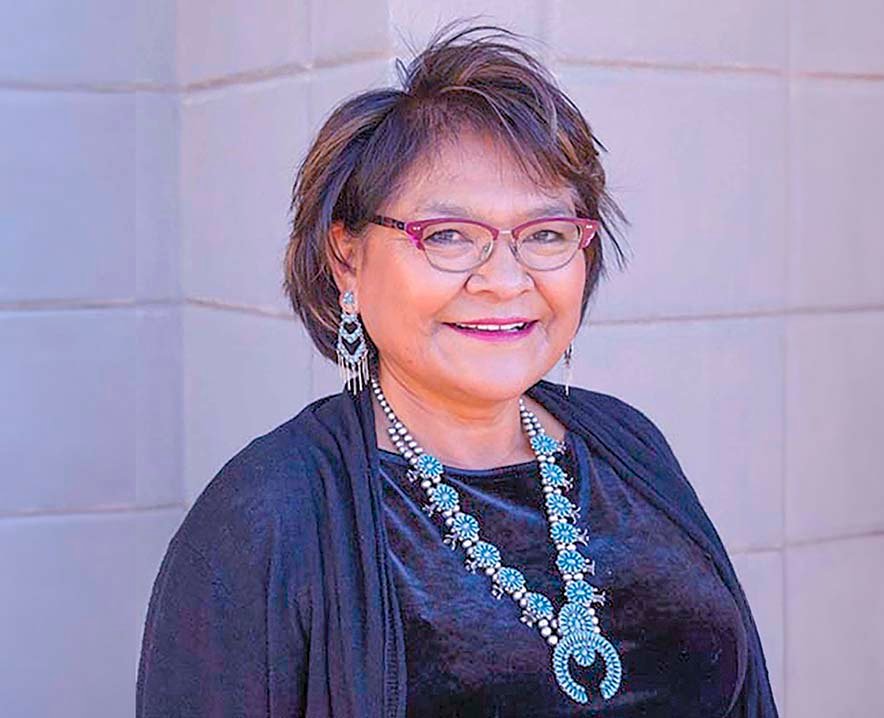Window Lock “Over time, you learn how county government operates,” said Coconino County District 5 Supervisor Lena Fowler, who is running for re-election and is serving her fourth term.
The other two candidates in the election are Angie Williams and Marie Acoughtry, both of Tuba City.
“There's still work to be done,” Fowler said.
Fowler described his focus as a “jack of all trades,” including areas of economic development, public safety, stable income through safe and reliable jobs, environmental justice, uranium tailings and water treatment advocacy, and community engagement.
“Internal-wise, there's been a lot of changes,” said Fowler, who has lived in Tuba City for more than 30 years but is originally from Tonalea, Arizona, about 30 minutes northeast of Tuba, where she grew up herding sheep and riding horses.
She is Tódích'íi'nii and was born for Naasht'ézhí Tábąąhá. Her maternal grandfather is Tł'ízíłání and her paternal grandfather is Táchii'nii.
While there are many areas in which Fowler shines, it is her passion and dedication to being a volunteer at heart that has brought remarkable accomplishments to her career.
Notable careers
In recent years, Lena Fowler has been deeply involved in community-based economic development efforts with great success.
More recently, he helped found the Colorado Plateau Economic Development Alliance, known as CPEDA, a collaborative venture that brings together Coconino County, the Navajo Nation and nearby cities and towns.
She said CPEDA is now ready to make a lasting difference in communities affected by a generations-old economic downturn exacerbated by the COVID-19 pandemic.
“The federal government provided unemployment benefits during the pandemic,” Fowler said. Many of the people here are self-employed — artists, entertainers and musicians, she added.
Everyone who applied for unemployment benefits during the pandemic and received assistance is now coming to her with a letter from the Arizona Department of Economic Security notifying her of repayment.
“What on earth is going on?” she asked, and contacted Arizona Senator Teresa Hatersley, who told her she had also received letters from individuals.
“We all came together and started asking, what is this all about?” Fowler said, questioning why recipients should have to pay it back because unemployment benefits are federally funded.
So far, by partnering with Hatathlie and working with DES, we have been able to resolve around 80 cases.
But she believes she will still receive letters. One letter reads, “The letter states that you may have committed a crime or fraud and that you will need to hire an attorney to appear before an administrative judge.”
“Some people hire lawyers to deal with this, some don't, some just pay it off,” she explained. And if you commit fraud, you'll no longer be eligible for state services.
“This is not correct,” Fowler said. “We are seriously investigating.”
More attention has been focused on the sobriety crisis that has sparked one of the biggest health care scandals in Arizona history, and Hatersley has called for accountability.
Community self-awareness
Lena Fowler believes that because many people are unaware of what is going on around them, people need to know about businesses, organizations, bills or services being offered in their community. Her mission is in the best interest of the people, because changes in the community, such as the closure of the Navajo Generating Station or the Kayenta Mine, have huge ripple effects.
NGS and the Kayenta mine were the backbone of the region's economy. Many factory and mine workers relocated to train or change jobs for new positions. Fowler, whose job it is to come up with solutions for his constituents and put them first, said it's been a tough time for the workers who lost their jobs.
Gazing at the Horizon
Lena Fowler, who lives in Coconino County, the second-largest county in the nation by area, has been a leading advocate for overseeing the project efforts on behalf of her north-central Arizona community.
Through her various roles and advocacy, she became one of the founding members of the Board of Directors of the Tuba City Regional Medical Corporation, formally known as the Tuba City Indian Medical Center, serving as a trustee and vice chair from 2001 to 2005, appointed by TCRHCC’s first CEO, Dr. Susie John.
The hospital board negotiated with the Indian Health Service, and TCRHCC won the second-largest IHS health care contract in the country while Fowler was president of the Indian Self-Determination Association, which is made up of all health care contractors under Public Law 93-638.
The effort fostered collaboration to resolve issues of common concern and led to successful lobbying of the Navajo Nation and Congress, Fowler said.
In both her personal and professional life, Fowler keeps her eyes on the horizon, seeking new perspectives on the lives of people in the county and the surrounding areas.
She said she is a founding member of Tuba City Concerned Citizens, a volunteer group working to remove uranium ore.
During her time in college, she served as secretary to the late Annie Dodge Wauneka, and later served as the first Native American intern and staff assistant to Arizona Senator John McCain.
Additionally, her accomplishments include writing county ordinances to support Native American ceremonies and practices, streamlining the Arizona delayed birth certificate process to allow many Native American members to obtain birth records, serving as a Bill & Melinda Gates Foundation Economic Mobility Leadership Network Fellow, serving as Vice Chair of the National Association of Counties’ Rural Action Council, and serving as Chair of Northern Arizona University’s Native American Advisory Council. She currently serves as Vice Chair of the Coconino County Board of Supervisors.
Fowler was selected as the 2017 recipient of Coconino Community College’s prestigious Distinguished Service Award, recognizing his outstanding contributions to the college’s mission.
“There's still a lot to do and a lot to continue,” she said.







